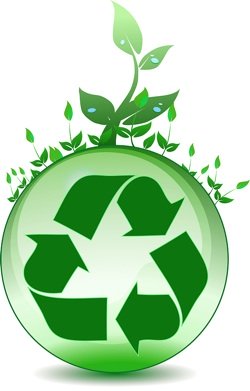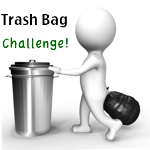Help the Environment by Recycling
Green it up! Recycle.
Recycling: Creating a circle from which we extract materials and to which we return materials for re-use when a product has served its purpose.

Help the Environment by Recycling. Here's how recycling materials back into the loop has become a big part of the environmental solution.
Responsible stewardship of the planet begins with treating the resources that exist with respect and using only what we need.
There's a lot of debate about whether we're the cause of environmental issues such as global warming, extreme weather and catastrophic natural disasters.
Common sense dictates that even if global warming isn't caused by us, it's still grossly irresponsible to consume all of the planet's finite resources within a 200 year span.
Reduce, Reuse, Recycle = Renewal
Reusing the materials that have already been harvested, rather than disposing of them has a far reaching impact. Not only does it preserve resources but it reduces the amount of drilling, digging, mining and logging for those resources and their transport by road, rail, air and sea to manufacturing facilities. That has a measurable and positive influence on the sustainability of raw resources, reduction of environmental emissions and energy consumption.
Entrepreneurial minds will recognize the win-win benefit of starting your own salvage and recycle business. A recession proof job that you can do at home with very few start-up costs. Not only is this a recession proof enterprise - it will probably thrive during down times.
Re-cycling consumes between 40% and 95% less energy than beginning with new raw materials, depending upon the type of material it is.
Between recycling and composting (which recycles vegetation), the amount of trash that leaves your home bound for the landfill can be almost eliminated.
Get Creative - Have a LOOK at some very clever ways to recycle old wood pallets!
Here's an ever growing list of what you can recycle.
Here is a list of specific ways that we help the environment by recycling
- Limits exploitation of resources - Not only can you help the environment by recycling but you can help to preserve raw resources for future generations. Manufacturers are bowing to consumer pressure and choosing recycled materials for production of their products and packaging, keeping the raw resources where they are.
- Reduces landfill accumulation - Land allocated to landfill sites is valuable space that can be better utilized. Space is at a premium these days and recycling reduces t he need for landfills. Less stuff in the landfill means better land management and more rapid decomposition of the stuff that is in there.
- Preserves habitat - The continued harvest of raw materials puts the habitat of all species at risk. Mining, logging, drilling and stripping of resources has seriously encroached upon the natural habitat available to important species, creating a precarious eco-balance. Recycling preserves habitat by slowing the destruction of established, bio-diverse areas.
- Limits the need for importation - Making use of the resources that are already here, decreases the transport needs for raw product. Development of local facilities for the reprocessing of many of these recyclables will further decrease shipping impact.
- Creates local jobs - Recycling facilities employ local people and also create jobs for the difficult to employ, reducing the societal cost of caring for the unemployable.
- Reduces energy consumption - To make substances like aluminum, glass, steel, plastic and paper, it takes less energy to re-process materials than to access raw
materials, transport them and manufacture them into the desired substance. Energy savings depend upon the type of material we're talking about.
The amount of energy that can be saved by recycling vs making a product from scratch are:
- -Aluminum 95%
- -Newsprint 40%
- -Glass 40%
- -Steel 60%
- -Plastic 70%
- Increases Sustainability - If we plan to live on this planet and escort new generations into a future full of possibilities, preserving the resources and using them responsibly will go a long way toward achieving that goal.
- Reduces cost of pay-per-bag disposal systems - By recycling and composting you can reduce the number of bags that are sent to the landfill. In our community we pay a fee of $3.50 per green garbage bag. Our garbage fee is less than $3.50 per month. We're trying to get down to 1 bag per 3 month period.
- Prevents soil erosion - Forests and stands of trees prevent the loss of precious land through erosion. Intricate living root systems hold soil in place preventing not only loss of land but clogging of waterways, destruction of habitat and entire eco systems. Recycling paper and wood products keeps trees where they are saving habitat and land.
- Protects wildlife - Recycling materials keeps them and their toxic by-products from entering landfills, groundwaters and sensitive ecosystems where wildlife is threatened by ingesting, inhaling, absorbing or becoming ensnared.
Visitors to our Help the Environment by Recycling page may also be interested in the following pages.
Home Composting








